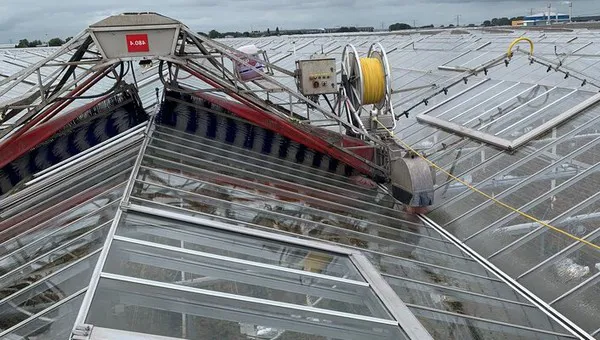During a considerable part of the year, crops can use all the natural light they can get. The principle that then applies is 1% more light = 1% higher production. This is when a thoroughly clean greenhouse really pays off.
Any greenhouse will get dirty over time. Algae, dust, soot, sand, and residues of crop protection products; all reduce the incoming light. In the case of light-loving crops, such as fruit, vegetables, and cut flowers, this adversely affects production. This is why cleaning the greenhouse quickly pays off.

The contracting firm Poot Reiniging in Maasdijk in the Netherlands specializes in two areas: cleaning and coating. During cleaning, it is important that the glass becomes properly clean while keeping any existing permanent or temporary coating intact. "We first discuss the nature of the dirt accumulation and how best to remove it with the grower. We are able to provide advice on the basis of our experience, and some growers have their own preferences. When you maintain it properly, the glass generally gets nice and clean without the need of using aggressive cleaning agents," says owner Erik Poot. Whenever possible, the greenhouse roof is simply brushed off with water. "Should this not be sufficient, we use an industrial soap in consultation with the customer," he says.
Thorough cleaning
There are other possibilities as well. "In areas where there are deposits of grease, chalk, or rust, the ReduSystems GS-4 is a good product. There are always some stubborn spots: for example, near the vent windows, there is often a strip of aluminum deposit because the water always drips down at the same point. It is impossible to clean that with soap alone. GS-4 is a very suitable product for this purpose."
Serious instances require a more aggressive fluoride cleaning agent. "That requires a great deal of care," says Poot. "For example, you need to consider the environment: bulb crops are unable to withstand fluoride."
If it is at all possible, when there is considerable dirt accumulation, he prefers GS-4. "This product cleans well and is less corrosive than aggressive cleaning agents," he says.
More coating because of hotter summers
On average, Poot's customers have their greenhouse cleaned twice a year, although some do so more often. Poot says he does notice the effects of climate change: "Because of a number of successive hot summers, growers have started to apply chalk or coatings more frequently, including growers who never did so before. They then skip a cleaning round. After all, the coating is removed in autumn using a cleaning agent, such as ReduClean, which has a cleaning effect at the same time. Because of this, our work has shifted somewhat: less brushing and far more coating.’ More light in the greenhouse also means reduced energy consumption. Here’s the basic rule: 10% more light translates into approximately 3% less gas consumption."
For more information: ReduSystems
ReduSystems
+31(0)13 507 53 99
[email protected]
www.redusystems.com
